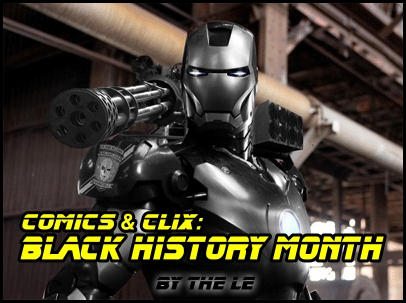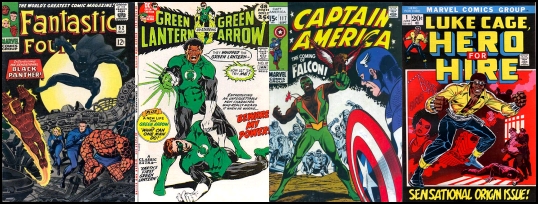Page: 1 2 3 4 5 6 
• Goto Comments
 Black History Month was established in the mid 1920s as a way to celebrate significant contributions made by blacks in America (note that Black History Month is observed in the UK in October). At the time, historical books did not cover the history of blacks very well, and this was certainly a way to help change that.
Black History Month was established in the mid 1920s as a way to celebrate significant contributions made by blacks in America (note that Black History Month is observed in the UK in October). At the time, historical books did not cover the history of blacks very well, and this was certainly a way to help change that.
Change was still slow for blacks in America though, as it wouldn’t be until 1954 that the Supreme Court ended segregation in schools, and not until 1965 that Congress passed the Voting Rights Act.
While comic books weren’t above making blacks stereotypical street thugs, they were willing to change and address racial issues. Everyone’s favorite rookie HeroClix, Black Panther, was the first real mainstream superhero in comics all the way back in 1966 (Fantastic Four issue #52). Think about how much he broke the mold: a prince of a technologically advanced nation who uses his brains over muscles.
Just a side note: One of my peers mentioned that I use the term "black" in this article rather than the term African-American or minority. This is intentional. It is not appropriate to use the term "minority" as that would expand the scope of this article to more than just blacks; and it is not appropriate to use the term "African-American," as it would not apply to the Black Panther (T’challa), who is not American (he is Wakandan) or even Ororo "Storm" Monroe (she is Kenyan).
Note that there were blacks featured in comics before this, but not at the superhero level. The first Marvel African-American superhero was the Falcon in 1969 (Captain America issue #117), then Luke Cage came onto the scene in 1971 (Heroes For Hire issue #1), and don’t forget the X-men’s Storm in 1975 (Giant Sized X-men #1).

Of course, Marvel wasn’t the only one bringing blacks into the mainstream. DC blessed us with John Stewart in 1971 (Green Lantern volume 2, issue 87), who is the first black to take on the mantle of a well-known superhero rather than being a brand new one. Note that this is far more common today, as we see blacks taking on the roles of Firestorm, Nick Fury, and Iron Man / War Machine. Heck, even Captain America was reimagined in 2003 to include Isaiah Bradley as the ‘Black Captain America’ (Truth: Red, White & Black, issue #1).
Of course, by 2002, blacks in superhero roles were commonplace, and so race wasn’t an issue when the first box of HeroClix appeared in your local comic/game store. Black super-heroes were just as good as their non-black counterparts in HeroClix… and unfortunately just as bad. So with no further ado, let’s look at the Top 3 Black HeroClix (in no particular order)...
Page: 1 2 3 4 5 6 